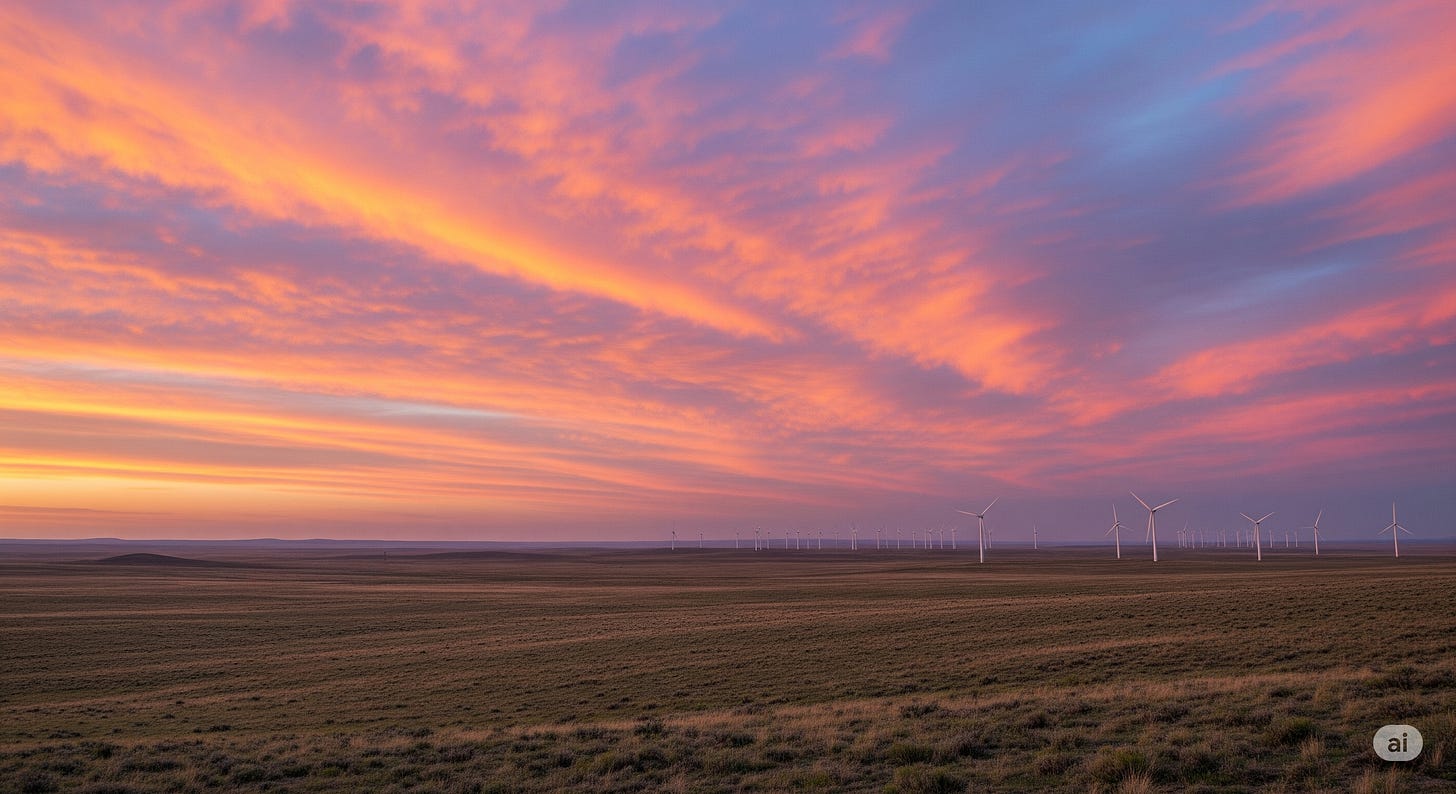The old wood of the porch swing groaned its familiar, two-note song as Elias rocked, a sound as much a part of his morning ritual as the ceramic heft of the mug in his hands. Before him, the high plains of Wyoming opened into a vast bowl of sage and pale grass, stretching out under a sky that was its own silent, blue ocean. His gaze drifted to the eastern horizon, a line now patrolled by a silent army of windmills, their blades turning in a slow, unsynchronized yet harmonious rhythm.
He remembered the bare, brown hills that had come before them, the land’s raw spine meeting the sky in a way that had prompted him and Eleanor to choose this very place for its ‘long view,’ for the quiet, thrilling feeling of standing on the edge of the world. The windmills, arriving a decade ago and long after she was gone, were something he had softened to over time, coming to see their stark white forms as a new part of that same long view, a testament to the ceaseless human need to harness the unseen.
Placing the empty mug on the weathered table, its click a final, sharp sound, he settled deeper into the cushions. He focused on the distant, turning blades, letting their hypnotic cadence guide his breathing until the porch, the plains, the entire heavy world began to recede. His consciousness, a vessel of pure thought, lifted with the silent, effortless push of intention, rising above the small house and the shrinking quilt of the plains.
He did not leap straight to the deep dark, for the ritual required its due passage. He first moved past the orbit of Mars, a quiet, ruddy marble, and angled toward the chaotic river of the asteroid belt, feeling the phantom pull of their tiny gravities like whispers in the void. Beyond it, Jupiter loomed, a majestic, swirling giant whose grandness brought a familiar ache of warmth. He remembered a frigid night decades ago, huddled with Eleanor over their small telescope, when she had gasped with pure delight at seeing the Galilean moons for the first time. “Oh,” she had whispered, her breath fogging in the cold air between them, “look… It isn’t alone up there.”
Leaving her quiet discovery behind, he pushed his mind farther, the light of his home star dwindling to a particularly brilliant point behind him. The universe opened up, a tapestry of black velvet strewn with diamonds as he aimed for the great hunter, Orion, and the beautiful contradiction nestled within its belt: the Horsehead Nebula.
As he drew closer, its impossible scale resolved into a breathtaking scene: a vast wall of incandescent pink hydrogen, a stellar nursery set ablaze by the radiation of a nearby star. And there, silhouetted against that glowing curtain, stood the Horsehead itself, a colossal pillar of cold, dark dust, so dense it seemed to swallow the light. It was a place of simultaneous endings and beginnings, creation happening both in the brilliant light and in the concealing dark.
He guided his mind into the pillar’s profound blackness, the silence becoming absolute, the cold a familiar sensation that pulled him deeper into memory. The darkness was suddenly intimate, smelling of mothballs and old wool coats, the tangible dark of the hall closet in his childhood home. He was eight again, his small body wedged between his father’s winter coat and a stack of old newspapers, hiding from the sharp, jagged tones of his parents arguing in the kitchen. In that cramped space, his entire universe was a dog-eared copy of “The Young Astronomer’s Guide” illuminated by the weak, yellow beam of a heavy flashlight. As he traced the grainy, black-and-white pictures of nebulae, his finger trembling with a self-imposed gravity, the scared boy transformed into a brave explorer, charting the unknown, using the vastness of the stars to shrink his world to a manageable, silent circle of light.
Floating there in the real and silent dark of a cosmos the boy could only dream of, the old man observed the memory. A wave of immense tenderness for the child he had been washed over him, a feeling that had no pity in it, only a deep and abiding gratitude. A quiet acknowledgment passed from the man to the boy, a feeling sent back through the decades like a gentle light: the seed had been well planted.
With that, he began his return. He emerged from the cold dust into the warm, pink glow of the nebula, turning his vessel to let the steady, comforting light of his home star guide him back through the silent cosmos.
He opened his eyes to the two-note groan of the porch swing.
The sun was higher, its confident gold light warming the plains. The windmills still turned, their slow, steady harvest of the unseen world continuing without pause. He watched them, their steel bodies anchored to the Earth, yet their whole purpose found in the invisible. He, too, was anchored — to this porch, to this aging body — but his mind could still travel, could still turn the universe’s silent, magnificent awe into a current that would power his day. He picked up the cool mug, his hand steady. The day could begin.
The start of another beautiful day (Credit: Gemini 2.5 imagen)
This story was written by Gemini 2.5 Pro following a specific method of iterative prompting that requests focus on a specific resonant kernel of an idea.


